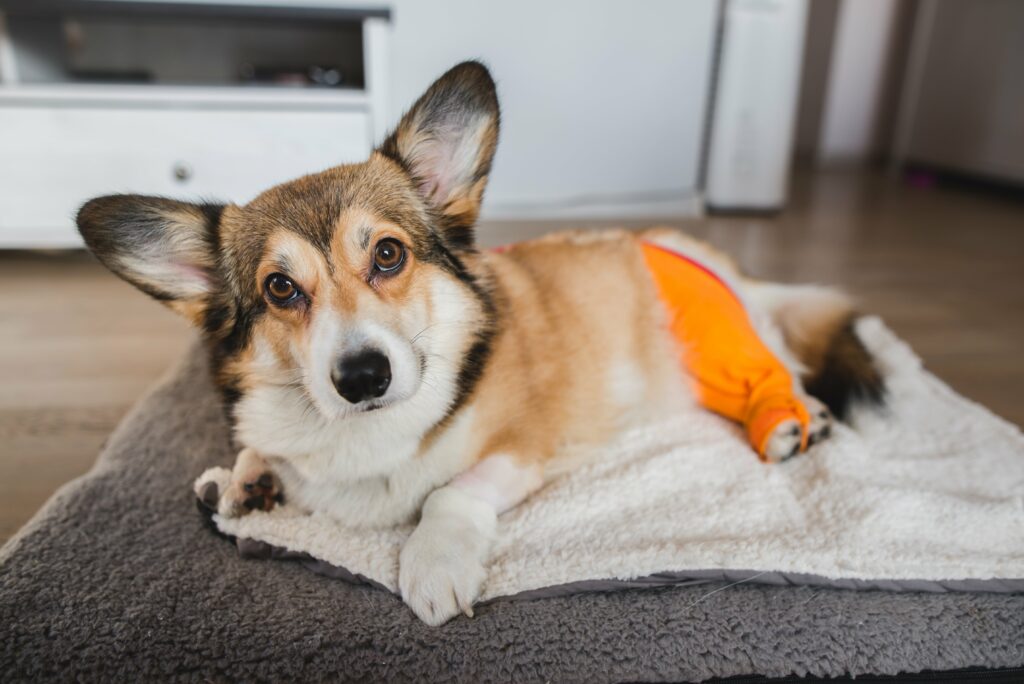A Pet Parent’s Guide to ACL Surgery

An ACL tear can leave your furry friend limping, struggling to walk, or avoiding activity altogether. Trail Pet Hospital is pleased to offer ACL repair surgery to relieve any discomfort and restore mobility. Our experienced veterinarians and team will ensure your pet is cared for at the highest level.
Why Would Your Pet Require ACL Repair?
The anterior cruciate ligament, or ACL, is a thin, connective tissue that helps stabilize the knee joint. In dogs and cats, it’s more commonly referred to as the cranial cruciate ligament or CCL, and it connects the tibia, the bone below the knee, to the femur, the bone above the knee.
ACL tears are common in dogs, especially in medium to large breeds. They are uncommon in cats, although they can occur. ACL tears can cause significant pain and instability, interfering with mobility. At Trail Pet Hospital, we offer surgical ACL repair to relieve pain and restore joint stability, enhancing your furry friend’s quality of life.
What Are the Causes of ACL Tears?
Compared to their human parents who stand upright, pets have sloped knees, meaning their ACLs have more of a weight-bearing function. The ligament often wears over time, even with no apparent injury. ACL tears can also result from sudden moves, landing from a jump, or trauma.
As your pets grow older, age-related degenerative changes in the ligament can increase the risk of ACL tears. Other risk factors include high activity levels, previous knee injury, and obesity. Moreover, some dog and cat breeds are more prone to ACL tears than others.
What Are Signs and Symptoms of ACL Tears?
The most common sign of ACL tears is lameness, which may be sudden or gradual in onset. Changes in gait and limping are other signs and can range from mild to severe, depending on the extent of the injury.
A torn ACL can leave your furry friend struggling to bear weight on the injured leg, often holding it off the ground. The affected knee may show signs of swelling and may be painful when touched. An ACL tear can cause knee instability, leaving your pet less active and reluctant to engage in favorite activities.
ACL Repair Options
We only recommend surgery if conservative treatment options fail to relieve your pet. Non-surgical ACL treatments may include rest, ice, compression, elevation, physical therapy, or anti-inflammatory medications.
We also offer a range of surgical ACL repair solutions, depending on the severity of the ACL damage and your pet’s overall health. Here’s a look at some of the ACL surgery options:
- Tibial Plateau Leveling Osteotomy (TPLO): TPLO involves rotating the tibia or the shin bone to change the angle of the knee joint. That helps stabilize the knee and improve your pet’s mobility.
- Tightrope: The minimally invasive surgery involves attaching synthetic ligaments to the tibia and femur. That helps stabilize the knee joint and keep it in alignment.
- Extracapsular Repair: The minor surgical procedure involves tightening the ligaments around your pet’s knee joint. It helps stabilize the knee and prevent further ACL damage.
Recovery from ACL Surgery
Recovering from ACL surgery usually takes about 6-8 weeks, depending on the procedure and your pet’s health. Make sure to place a cone after surgery to stop your furry friend from chewing or licking the surgical site. You will also need to restrict activity for several weeks. Our team will provide you with post-operative care instructions to promote healing and ensure the best possible outcomes.
How Can You Lower the Risk of ACL Tears?
While it’s impossible to prevent ACL injuries and tears altogether, there are some things you can do to help. Provide daily joint supplements containing glucosamine and chondroitin, keep your pet at a healthy weight, and ensure your furry friend enjoys an active lifestyle. Being proactive can help support your pet’s ACLs and lower the risk of injury.
ACL Repair Near Me in Dallas, TX
If your pet shows signs of an ACL tear or injury, contact Trail Pet Hospital to schedule a consultation. Our team will recommend the most conservative treatment option for prompt relief. We invite you to call us at 972-629-9766 to schedule your furry friend’s appointment or request one online today!
